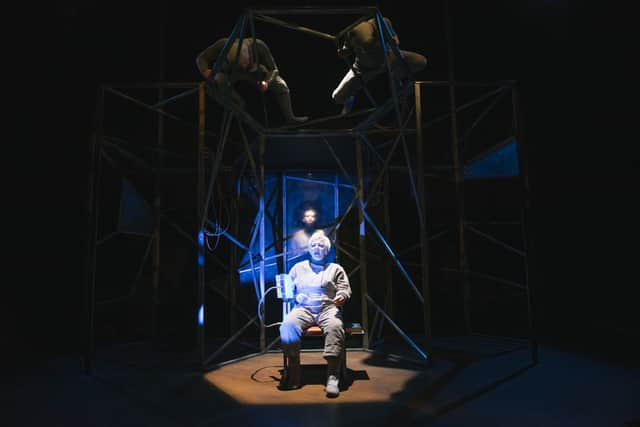THEATRE REVIEW: E M Forster's The Machine Stops


E M FORSTER’S THE MACHINE STOPS
at Cast, Doncaster
(March 21-22)
A BLEAK vision of the future is not unusual in the arts. It seems that each generation expects those following to be living in sheer subjugated hell.
The Machine Stops is unusual though, for a number of reasons.
Advertisement
Hide AdAdvertisement
Hide AdIt was written by a most unlikely creator in the shape of E M Forster of A Passage to India fame. Not normally associated with sci-fi , Forster’s work considers life far into the future.
He published The Machine Stops as a short story in 1909 and it offers up a dystopian vision of life when people live in isolated cells underground, communicate by computer, hardly travel and don’t go outside.
Sound familiar?
The story could certainly hint at the way our lives are going as machines take on more and more functions of our lives, and most of the characters in the story do not seem to regard it as a bad thing. They are happy to live like this as The Machine meets their every need.
Everyone appears equal. Everyone is content. Everyone is fed and entertained and educated. People have thousands of friends (though they don’t have to go through the hassle of meeting them in the flesh). It all sounds quite acceptable.
They are protected, they are catered for.
Advertisement
Hide AdAdvertisement
Hide AdBut Forster sees freedom in a different way. Not the freedom of getting everything you want but the freedom of not being subservient to something else (however willingly).
This dichotomy comes to a head when Vashti, living happily in her isolated home and getting everything she needs, is contacted by her son Kuno.
He asks her to visit him, which she can’t comprehend as they can communicate electronically whenever they want, and he tells her he wants to go to the surface.
Vashti does leave the safety of her home to visit Kuno via an airship journey which terrifies her because she has to view the surface of the world, has to experience the sun on her face and has to actually talk to people.
Advertisement
Hide AdAdvertisement
Hide AdBy the time she meets Kuno, she is in no mood to hear of his journey to the surface where he can see the stars and breathe the fresh air. It contradicts everything she has been told by The Machine and it unnerves her.
Later, The Machine begins to break down, cutting off all functions. Kuno returns to rescue his mother and tells her what his view of freedom is — to walk on the earth’s surface, to think for himself.
All important messages to us today, and The Machine Stops faithfully puts across Forster’s bleak tale with effect.
Ricky Butt plays the role of initially confident then vulnerable Vashti with credibility and Rohan Nedd as Kuno is perfect as the wide-eyed but perhaps naive youth eager for a better life.
Advertisement
Hide AdAdvertisement
Hide AdMaria Gray and Adam Slynn spend most of the play performing Olympian gymnastics around the stage set as functionaries of The Machine. They fix it, they maintain it, they (usefully for the audience) also offer a narration, which is ironic as this is The Machine supplying the audience with what it needs in the same way it supplies the citizens of the story.
The production is tight and doesn’t get too bogged down with discussions about freedom.
When the end comes for The Machine, the lighting and sound effects work particularly well.
It’s a clever show that makes the viewer think about issues such as power and control, what life means, what freedom could be. Forster, a well-known humanist in his day, even takes a swipe at religion.
Advertisement
Hide AdAdvertisement
Hide AdWhen all is going well, The Machine bans religion, but towards the end it encourages everyone to believe in it as a divine offering. He also hits out at the intellectuals who accept the way of life offered by The Machine because it suits them, surely another issue to think about today.
The Machine Stops but, thankfully, the entertainment doesn’t in this power-packed co-production by Pilot Theatre and York Theatre Royal.
ANTONY CLAY